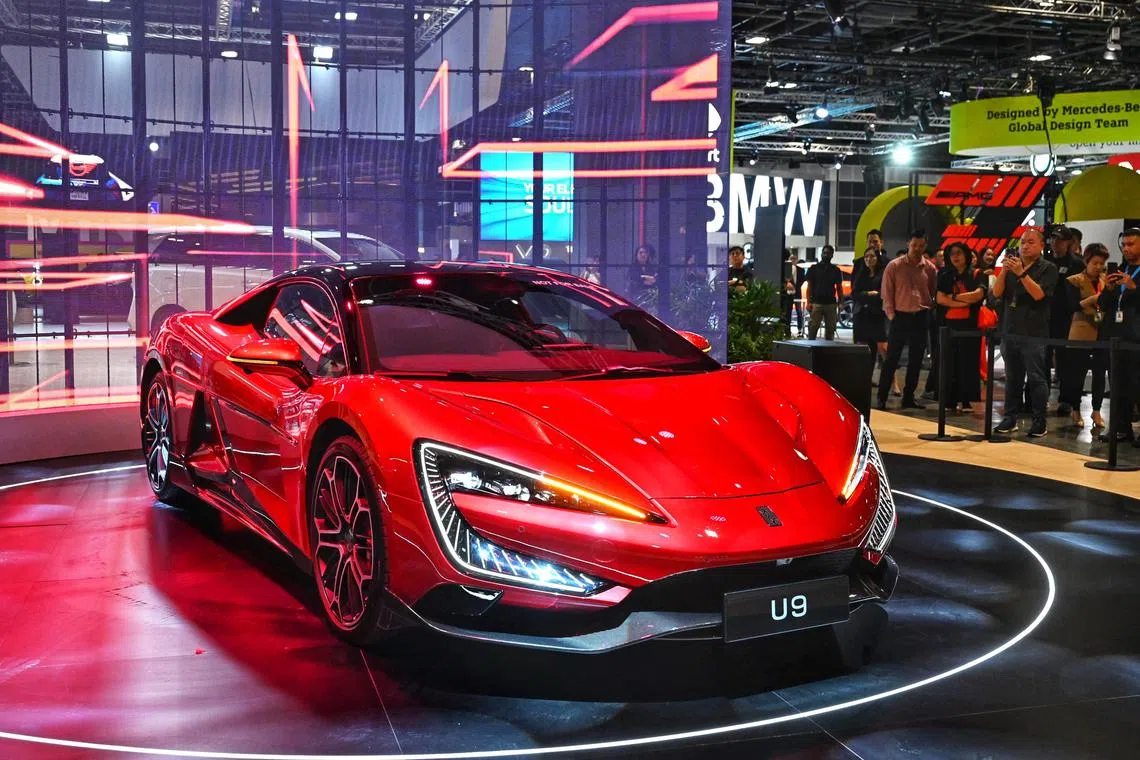Why China is trying to tame its electric car frenzy
Sign up now: Get ST's newsletters delivered to your inbox

Chinese carmakers like BYD have been conquering the world with their electric vehicles, but the competition has become ruthless.
PHOTO: ST FILE
SHENZHEN, China – China is conquering the world in electric vehicles (EVs). Its carmakers produce far more than those in any other country and outpace them on innovation.
China’s appetite for petrol-powered cars is also fading by the week. In each of the last five months, battery-powered and plug-in hybrid cars made up more than half of all cars sold.
But look closer at the industry, and the picture is not pretty. Already, fierce competition among carmakers has become ruthless, with about 50 carmakers fighting for customers by slashing prices again and again.
Manufacturers facing ruinous losses are struggling to pay the companies that supply their parts. And yet they keep borrowing from state-run banks to build more factories, leading to extensive overcapacity.
The frenzy has captured the attention of the highest levels of China’s government. Officials have started a campaign against “involution”, which they define as excessive competition.
Chinese President Xi Jinping led a Politburo meeting on the economy on July 30 that ended with a statement declaring: “It is a must to reinforce industry self-discipline to prevent vicious involution competition.”
The results have been mixed. In early June, under orders from China’s Cabinet, 17 carmakers agreed to pay their suppliers within 60 days of receiving parts. But a government report on compliance in August listed only three carmakers, all partly or entirely state-owned, as having set up systems for prompt payment.
Even BYD, the world’s largest EV maker, is now running into trouble. It said in August that its profits fell by almost a third in the spring compared with a year ago because of price competition.
Discouraging investment by carmakers has been difficult. Even with a slight slowing in July in response to the government’s admonitions, the industry’s investments were up 21.7 per cent in the first seven months of the year, compared with the same period in 2024. That makes it the fourth year in a row of torrid growth.
Overcapacity and price wars
Involution in the auto industry also shows the cost of China’s investment-led growth strategy. For example, even a slight slowing in July of the pace of investment in manufacturing equipment dampened the entire economy’s performance.
Electric cars are a lot like smartphones or laptops: The more you make, the cheaper it is to make even more.
Carmakers are constantly building ever larger factories to grab more market share, even when that means selling electric cars for less and less money.
“This is a race to dominate, not a race to profitability,” said Mr Bill Russo, chief executive of Automobility, a Shanghai-based electric car industry consulting firm.
In 2024, 129 brands in China were selling cars that ran mainly or entirely on electricity, and only 15 of them would be financially viable by 2030, according to an estimate by AlixPartners, a global consulting firm.
“More than that will keep going, but they will require investors with deep pockets to keep them going,” said Mr Stephen Dyer, head of the firm’s Asia automotive practice.
The roster of China’s top electric carmakers starts with BYD. It has stiff competition from the Geely Group, with its many brands including Zeekr and Polestar, as well as Tesla, which has struggled but is still a popular brand in China.
The Chinese consumer electronics company Xiaomi branched into electric cars in 2024 and its first model, the SU7, already outsells all but five other models in China.
Absent from the top of China’s EV rankings are four state-owned carmakers with ties to China’s national government: FAW Group, Dongfeng Motor, Changan Automobile and GAC Group. The government-owned giants are strong in internal combustion engines but weak in electric cars.
Beijing is struggling to contain the industry’s overall capacity in part because the state-owned companies refuse to shrink to offset the growth of the private companies making so many electric and hybrid vehicles.
Closing state-owned factories that make petrol-powered cars and laying off their workers is politically difficult, especially in a high-profile industry like cars.
Beijing is concerned partly because banks are potentially exposed to heavy losses if carmakers and their parts suppliers cannot pay their bills.
As big employers in an industry that is the pride of China, carmakers have the clout to make sure that others keep financing their losses. And banks have been under regulatory mandates to lend for clean energy technologies.
Auto parts manufacturers have had to accept being paid months late, and then have had to take out bank loans to keep going. Local governments, many of which borrowed to establish companies, now need to borrow even more to provide financial lifelines to companies.
The carparks of car dealerships are bursting because of the oversupply problem. Yet powerful carmakers insist that the dealers keep buying cars. All along, cuts in sticker prices have shrunk the value of dealers’ inventories.
“Dealers are forced to promote products at prices below cost, which drags down the credibility and sustainable development of the entire industry,” the dealership associations of four provinces in the Yangtze River Delta said in a joint statement this summer.
Another outcome of the overcapacity is that Chinese manufacturers now export a fifth of their production, up from almost none before the Covid-19 pandemic.
The exports have established China’s carmakers as global powerhouses at the expense of other countries’ car industries. That has been a central trigger for the trade backlash and tariffs against China in the West. NYTIMES
Additional reporting by Li You


